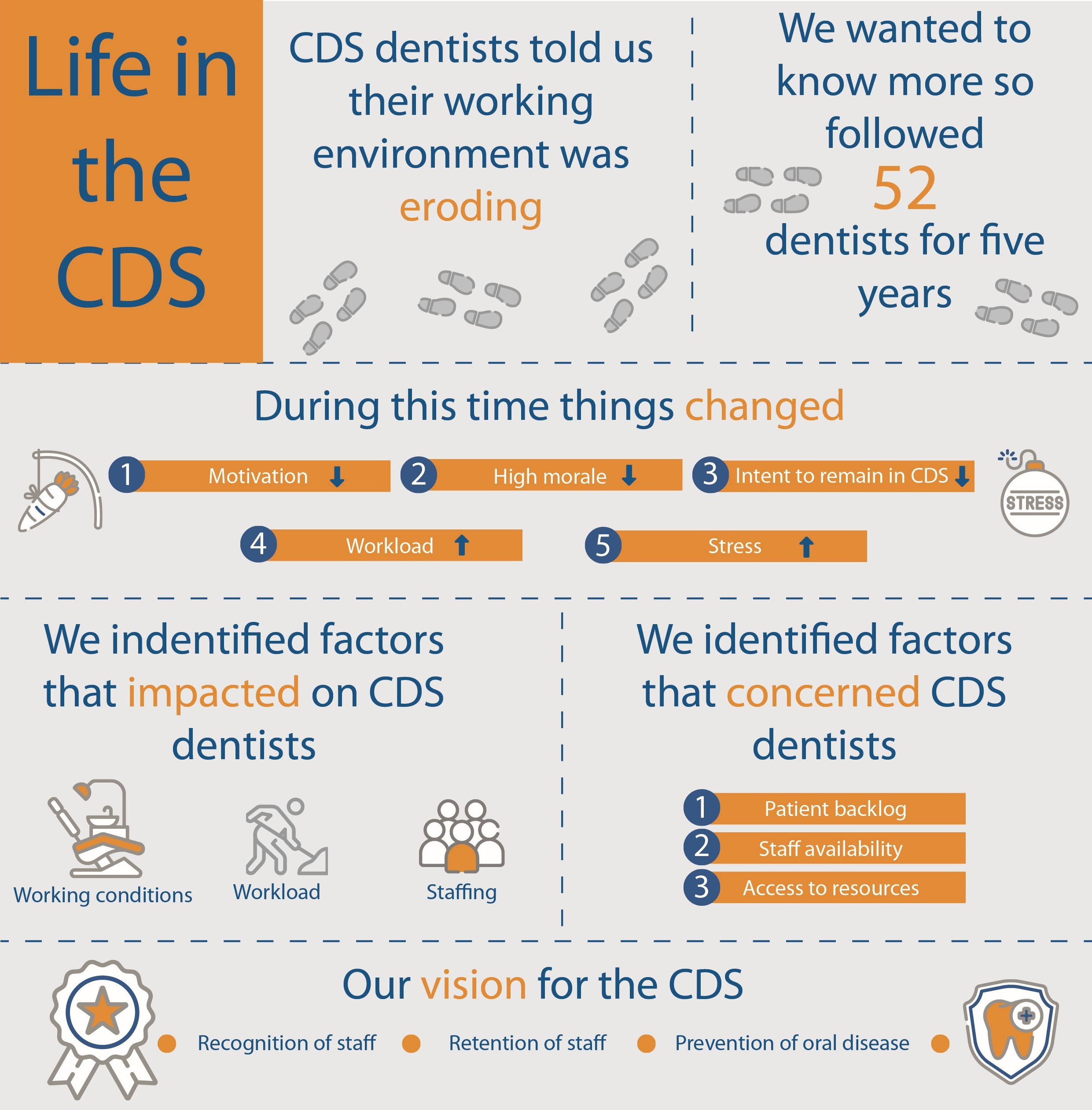Community Dental Services: Navigating the Challenges
Published in Healthcare & Nursing and General & Internal Medicine

Explore the Research

Five years in the community dental service: clinicians’ perspectives
British Dental Journal - Five years in the community dental service: clinicians’ perspectives
Dental services
Accessing dental services has become challenging with NHS appointments more difficult to find and headlines covering patients extracting their own teeth and travelling abroad to obtain services. This is one side of dentistry - how about other dental services … and how are dentists coping in the current conditions?
The study
In 2017 we spoke to dentists working in the service that treats and cares for vulnerable patients including individuals with additional support, care or healthcare needs – the Community Dental Service (CDS). Dentists in the CDS work in clinics and hospitals, visit schools, conduct research, treat patients in their homes if they cannot get to a clinic and train young dentists. We asked these dentists about their work, their lives and the services they provide. They described a failing service, the accumulative effects of a continued lack of investment and the spill over in demand from high street dentistry. We were concerned, wanted to know more and wanted to understand how the healthcare landscape affected these dentists over a longer period. To learn more about it we spoke to them once a year for five years with our analytical study based on the data we collected.
Dentists told us they were concerned about meeting patient need but were increasingly satisfied with the care they provided. They were less motivated in 2023 than they had been five years ago and stress and workload had increased with staffing and workload affecting them negatively (Figure 1). We made some unexpected findings and discuss why this might be with reference to the political landscape and defence mechanisms such as learned helplessness.

What has happened since?
We collect information from CDS dentists annually and have focused on mental health as we felt wellbeing for those working within the sector was important and needed our attention. We continued to speak to CDS dentists and heard concerning reports of burnout, stress and abuse in the workplace. Over a third of dentists working in the CDS are seeking professional help for work stress with the most employed coping mechanism being building resilience. We asked about abuse in the workplace and found in 2022-2023 30% had faced physical violence and over 70% had been verbally abused.
Dentists cannot rectify the problems as they see them. They feel powerless and guilty and are reluctant to discharge patients knowing they will be unlikely to find care elsewhere. The increase in patients to be seen, the never-ending waiting lists and the increasing abuse received in the workplace adds to the immense workload they face. Working over contracted hours has become the norm and those we spoke to could see no sign of improvement. They do not feel supported.
Why is this important?
The intolerable working conditions continue to take their toll on those working within this sector of dentistry. The government’s Dental Recovery Plan, designed to ensure easier and faster access to NHS dental care across England, aims to address general dental practice access but does not tackle the needs of the CDS. Removing barriers to accessing high street dentistry could impact on the workforce and service issues seen within the community services, via lessening spill over, but will not address factors within the CDS. The aging population and increase in those with multi-morbidities indicates that the need for the CDS will increase and this is coinciding with a period where staff numbers are falling and so is the number of specialists in special care dentistry and paediatric dentistry and this is all working towards what could be described as an omnicrisis.
What we will do next
Dentistry has long been neglected and the CDS even more so. We are using our findings to help drive improvement in the CDS. We think dentists are bearing the brunt of poor decision making for dental services as they are a point of contact with the public. We want there to be a service that is recognised, a service that values dentists and allows the time needed, and has the resources, to provide necessary care and ensures patients are able to receive the treatment they deserve. We want prevention to be a priority. We are working with others to ensure a holistic approach is taken to achieving this vision.
A word from Giten Dabhi the England Community Dental Services Committee chair
It is totally unacceptable that community dentists are facing an overwhelming amount of stress and abuse while working diligently to care for their vulnerable patients. This ongoing and worsening situation urgently requires more resources to support these dedicated professionals and ensure they can continue providing essential care.
Giten Dabhi was elected as the Chair of England Community Dental Services Committee in 2022 having served on the committee for over a decade. He graduated in 1998 at Guys Dental Hospital and has worked in dental and district general hospitals, general practice and community services. Giten has spent more than two decades working as a full-time CDS clinician in London.

Follow the Topic
-
British Dental Journal

This is an international, peer-reviewed journal for the dental community, published by Springer Nature on behalf of the British Dental Association.
Related Collections
With Collections, you can get published faster and increase your visibility.
Periodontology
Publishing Model: Hybrid
Deadline: Jun 30, 2026

Please sign in or register for FREE
If you are a registered user on Research Communities by Springer Nature, please sign in